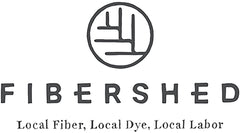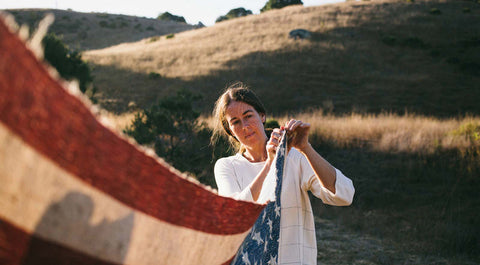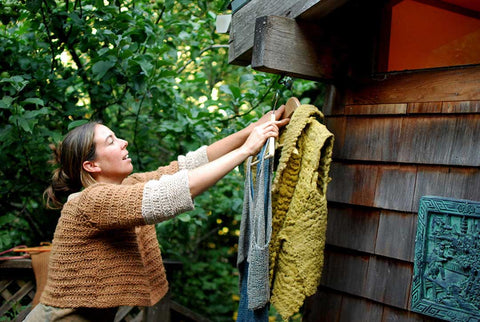
Outside the sun is going down and a chill is setting in the air. The traffic is picking up as the hustle and bustle of the evening rush begins. Most people are heading home to prepare dinner and begin their evening routines, but this is not the case for the crowd that has gathered at the Indigenous retail location in Petaluma, California. Inside the store, a group of local designers, industry professionals, and fashion enthusiasts excitedly await for the conversation to begin. As we sip our local beverages and chat among ourselves, the dialogue naturally turns to sustainable fashion. It’s easy to see there is a consensus among the room, great fashion shouldn’t have to come at a high environmental cost.


Rebecca Burgess, Executive Director of Fibershed and author of the best-selling book Harvesting Color, is the featured speaker of the evening. She is joining Indigenous Co-Founder, Scott Leonard, to lead a discussion on sustainable fashion and ethical clothing production. These days Rebecca wears many hats. In addition to her work at Fibershed and her experience teaching and writing curriculum on the subject of natural, sustainable fashion, she serves as Chair of the Board for the Carbon Cycle Institute. Today the Carbon Cycle Institute is partnering with UC Davis, working to restore carbon to our soil which will ultimately restore our land. The institute grew out of the Marin Carbon Project (MCP), a group of independent agricultural institutions in Marin County, working to reverse climate change, improve farm productivity and viability, and enhance ecosystem functions through the practice of carbon farming. Our agricultural systems produce not only fiber and food, but also flora and fuel. If we are going to truly restore working landscapes, MCP founders believed we must address fibersheds, foodsheds, florasheds, and fuelsheds. This may seem like a huge feat, but carbon sequestration has proven successful, and research has shown that the simple act of dusting a field with compost can offset carbon emission by 1-3 tons per acre per year! Today, Rebecca says, we can utilize carbon farming to help lift us out of “carbon debt” and restore our soil.
“And our soil is ready to be restored!”
Rebecca’s vision wasn’t always this big. The company grew organically out of a personal experiment. What later would grow into Fibershed the company, all began with a thought that was planted into Rebecca’s consciousness back when she was a college student, leading a children’s summer art program. She recalls helping students tie-dye t-shirts and how they had to wear gloves, masks, and aprons to protect themselves and prevent the dye from getting on their skin or in their lungs. Then they dunked their shirts—which the students were ultimately going to be wearing on their bodies—into these chemical compounds, and finally poured the excess dye down the drain. Somewhere the logic wasn’t lining up.

Later, on a trip to Asia, Rebecca was inspired by the way communities locally sourced fibers and dyes for their textiles and clothing. These materials were grown and processed within the community. She thought if they can do it, we can too. This seed of thought sprouted and came to life. She committed from then on to wearing only garments that were sourced entirely from within 150 miles of her home.
“I made this commitment to live by my own set of values and embody that.”
“I made this commitment to live by my own set of values and embody that,” Rebecca says. And as Scott put it, she really is living it! She donated almost all her clothing, down to her socks and underwear, and gave herself 6 weeks to materialize a wardrobe completely sourced from within her local fibershed: all the dye, all the fiber, all the labor. This experiment was meant to last one year, but it soon grew into a movement bringing the farming community and the fashion community together in a beautifully symbiotic way.
The story was moving. It was a story of the birth of something profoundly powerful. The audience responded with an enthusiastic round of applause. Scott declared, “The solution to the planet is found in the type of work you [Rebecca] do.” Modestly though, she reminds us that we must “keep advocating and repeating ourselves. The scale is through replication. We have to keep empowering communities.”
“I used myself as this experimental canvas for this idea of a Fibershed in North America, in California… [because] as the wearer, we are a canvas…that canvas is clear to others.”
At the end of the evening, the discussion turned toward the future of sustainable fashion, and audience members joined in, sharing ideas for creating community, educating others through workshops and classes, and generally raising awareness while inspiring creativity. The collaboration happening in the moment was a truly beautiful thing. This is how real change is born. It starts with an idea, an experiment, a discussion and a commitment to continual improvement for the betterment of ourselves and our planet.

As Rebecca eloquently put it, “I’m a fan. I’m a student.” While I can’t speak for everyone, as for myself and the rest of the Indigenous family, I’d say the feeling is mutual. Let’s keep supporting those doing good, while learning how we can do even better.
Written by Julie Benefield for Indigenous




0 comments